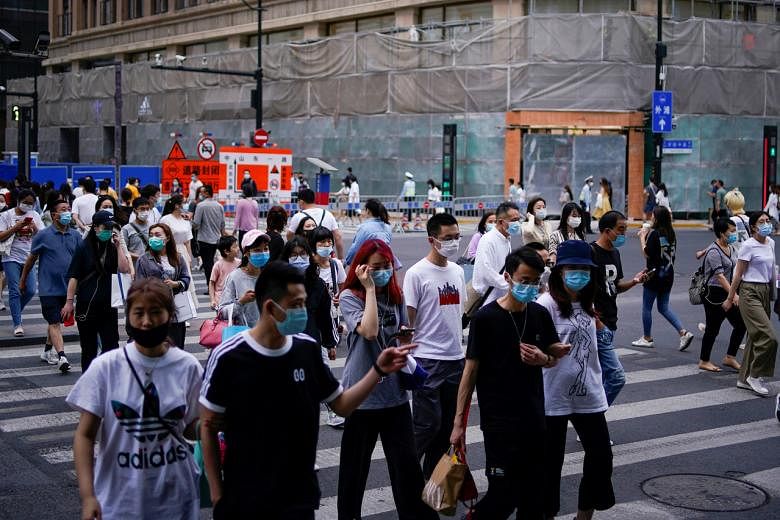BEIJING (NYTIMES) - Before China can fully recover from the devastation of the coronavirus outbreak, it needs to find people like Huang Bing a job.
Huang, who graduated last year from one of China's most prestigious drama schools, got an offer in December for her first job in show business, working for a company that books bands for bars in Beijing and Shanghai.
The coronavirus, which virtually froze China for weeks, brought that gig to an end before it began. Huang has picked up freelance film production and publicity work, but she has slashed her spending and is counting her money.
"When it was April and I still couldn't start my job, I started to feel worried," said Huang, 24. "I began worrying that I may not be able to work this year at all. I can't just keep waiting."
Relations with the United States are at their lowest point in decades and Hong Kong is seething with fear and anger, but China's biggest problem by far is getting its people back to work. Millions of workers were laid off or furloughed while China battled the coronavirus outbreak. Many of those who kept their jobs have seen their pay cut and future prospects narrow.
China's youngest workers in particular have entered perhaps the country's toughest job market in the modern era. Many are reducing their expectations to take any job they can get. The pressure is about to intensify: Another nearly 8.7 million young college graduates are waiting in the wings this year.
For the world, global growth will be hard to rekindle until China gets fully back to work. But the damage to the Communist Party could be long-lasting. It derives its political power from the promise of delivering a better life for the Chinese people, a promise that has become increasingly difficult to fulfil.
Demonstrating the depths of the uncertainty, Chinese leaders meeting in Beijing since last week parted with precedent and declined to set an annual economic growth target. But they have unveiled other goals that detail their biggest worries, including cutting unemployment in the cities and taming food inflation, which has jumped because of outbreak-related supply disruptions and an unrelated swine disease.
Chinese leaders have acknowledged broader problems in the workforce. China's factory workers have been hit by the trade war with the United States. Service sector companies like online delivery firms are hiring, but these jobs offer low pay and high stress.
Last week, at the opening of China's annual parliamentary session, Li Keqiang, China's premier, cited both unemployment and the hundreds of millions of underemployed workers doing odd jobs with flexible hours and low pay.
"We will make every effort to stabilise and expand employment," he said.
To help, China's top leaders pledged last weekend to "use all possible means" to create jobs, including a goal to create 9 million new jobs this year. But many of its plans borrow from Beijing's old playbook, which include spending on public works, funding wasteful state-run companies and keeping the financial sector supplied with new money.
Those tactics have proved to be less effective in recent years. Even when banks are pushed to lend to smaller businesses, China's biggest group of employers, the borrowing burden is still too high for many companies. Spending on public works gets less bang for the buck than it once did, as China's economy matures and as its workforce becomes increasingly college-educated and office bound.
China's current official unemployment statistics, while considered imprecise by many economists, nevertheless suggest the depth of the problem for young workers. The jobless rate for people ages 16-24 totalled nearly 14 per cent, more than twice the official figure for the nation as a whole.
In forums online, young job seekers share their frustrations.
"I'm about to cry," one person recently wrote on Weibo, the popular Chinese social media service. "Finding a job is as difficult as finding a boyfriend." Many use words like "lost" to describe their state of mind.
"I've exhausted all kinds of software for job hunting," another person wrote. "Did not find a job! What more can you do!! I'm going to lose faith."
Many of these job seekers have lowered their salary expectations and are choosing to focus their energy on finding job security at a state-owned company.
While private firms are typically more popular, competition for jobs among them has become fierce, according to a recent survey of 3,000 university graduates by Liepin, a recruitment platform. Three-quarters of graduates said they expected to earn less than US$1,100 (S$1,558) a month, one of the lowest salary ranges in the survey.
Chinese companies that are hiring can afford to be choosy. Recruits can choose from a larger pool of candidates, said Martin Ma, a human resources officer for iSoftStone, a software development company that has more than 60,000 employees and counts big foreign and domestic companies as clients. Starting salaries are lower.
"The posts available for graduates are all basic, and the salary isn't too high," Ma said. "The graduates do not fully understand the market. Their expectations are quite high."











